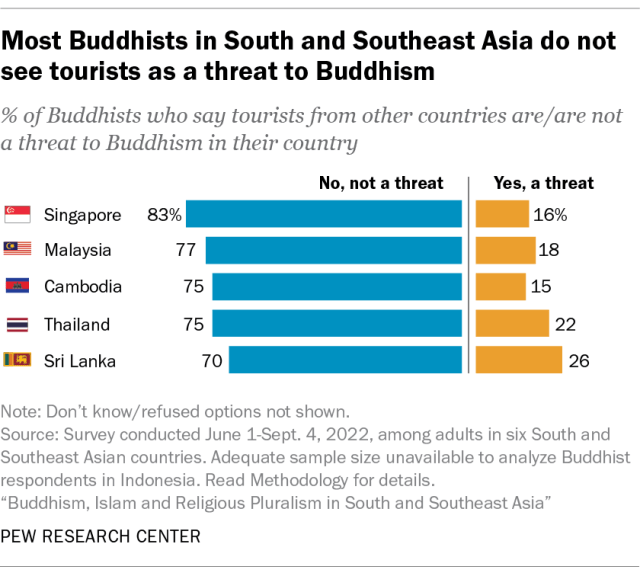Every year, tens of millions of tourists travel to South and Southeast Asia. Occasionally, visitors from the United States, Europe and elsewhere have gotten in trouble for disrespecting Buddhist sites and traditions in this part of the world.
Despite such incidents, majorities of Buddhists in five South and Southeast Asian countries surveyed by Pew Research Center in 2022 say it is appropriate for foreign non-Buddhists to visit Buddhist sites such as temples, pagodas and dhamma halls for tourism. The surveyed countries included Cambodia, Malaysia, Singapore, Sri Lanka and Thailand. (We also surveyed a sixth country, Indonesia. But due to sample size limitations, the views of Indonesian Buddhists cannot be reported separately in this analysis.)
This analysis is drawn from the Pew Research Center report “Buddhism, Islam and Religious Pluralism in South and Southeast Asia.” For that report, we surveyed 13,122 adults across six countries in South and Southeast Asia using nationally representative methods. Interviews were conducted face-to-face in Cambodia, Indonesia, Sri Lanka and Thailand. They were conducted on mobile phones in Malaysia and Singapore. Local interviewers administered the survey in eight languages from June to September 2022.
This survey includes three countries in which Buddhists make up a majority of the population (Cambodia, Sri Lanka and Thailand); two countries with Muslim majorities (Malaysia and Indonesia); and one country that is religiously diverse, with no single group forming a majority (Singapore).
Respondents were selected using a probability-based sample design. In Thailand, this included additional interviews in the country’s Southern region, which has larger shares who are Muslim. Data was weighted to account for different probabilities of selection among respondents and to align with demographic benchmarks for each country’s adult population.
For more information, refer to the report’s methodology section or the full survey questionnaire.
Majorities of Buddhists in these countries also say it is appropriate for non-Buddhist tourists to participate in Buddhist practices, such as meditation and chanting. That includes nine-in-ten Buddhists who say these activities are appropriate in Thailand.
In most countries surveyed, large shares of Buddhists also believe it is appropriate for foreigners of a different religion to marry Buddhists from their country. That includes three-quarters of Buddhists in the Buddhist-majority country of Cambodia and 88% in the Muslim-majority country of Malaysia.
However, there is less support among Buddhists in the surveyed countries for foreign non-Buddhists wearing Buddhist images or having Buddhist tattoos anywhere on the body.
Take Thailand, for example, where there has been a recent rise in tourists traveling to the country to receive traditional Sak Yant tattoos. Fewer than four-in-ten Buddhists in Thailand (35%) say it is appropriate for non-Buddhist tourists to have Buddhist tattoos on their body. Similar shares of Buddhists hold this view in Cambodia and Malaysia (36% and 38%, respectively).

Attitudes on this question are slightly more open in Singapore, the most religiously diverse nation surveyed. Nearly half of Buddhists in Singapore (48%) say these types of tattoos are appropriate for non-Buddhist foreigners.
More broadly, most Buddhists in the surveyed countries say tourists from other countries are not a threat to Buddhism in their country. More than three-quarters of Buddhists, for example, say this in Malaysia and Singapore (77% and 83%, respectively).
Differences by age and education
On balance, younger Buddhists and those with more education are more likely to say that many of these activities are appropriate for non-Buddhists from different countries.
For example, 82% of Cambodian Buddhists under 35 say it is appropriate for foreigners who are not Buddhist to marry Buddhists from their country. That compares with a smaller majority (70%) of Cambodian Buddhists ages 35 and older.
Singapore, meanwhile, highlights differences by education. About nine-in-ten Singaporean Buddhists with at least a college education (93%) say it is appropriate for non-Buddhists from abroad to take part in Buddhist meditation or chanting. Roughly three-quarters of Singaporean Buddhists with less education (78%) are supportive of this practice.
Sri Lanka stands out
Compared with Buddhists in other countries, those in Sri Lanka are more resistant to non-Buddhist foreigners doing several of the activities asked about in the Center’s survey.
For example, only 54% of Sri Lankan Buddhists think it is appropriate for non-Buddhist foreigners to marry Buddhists from their country. By comparison, three-quarters or more of Buddhists in the other surveyed countries say such marriages are appropriate. (Sri Lanka has additional restrictions on interfaith and foreign marriages beyond those in the other surveyed countries.)
And Sri Lankan Buddhists particularly stand out on whether wearing images of Buddha or tattoos of Buddhist symbols are acceptable for non-Buddhist foreigners. For instance, only 4% of Sri Lankan Buddhists say it is appropriate for non-Buddhist people from other countries to have Buddhist symbols or images tattooed on their body wherever they like. In all other countries surveyed, at least a third of Buddhists say this is appropriate.




